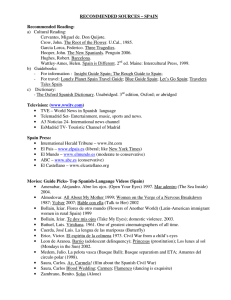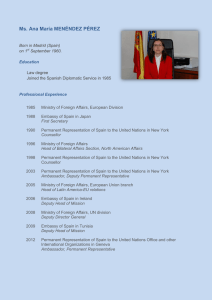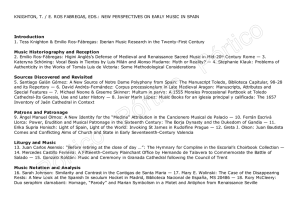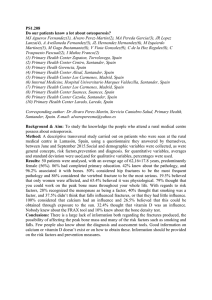Inside Spain 33 - Real Instituto Elcano
Anuncio
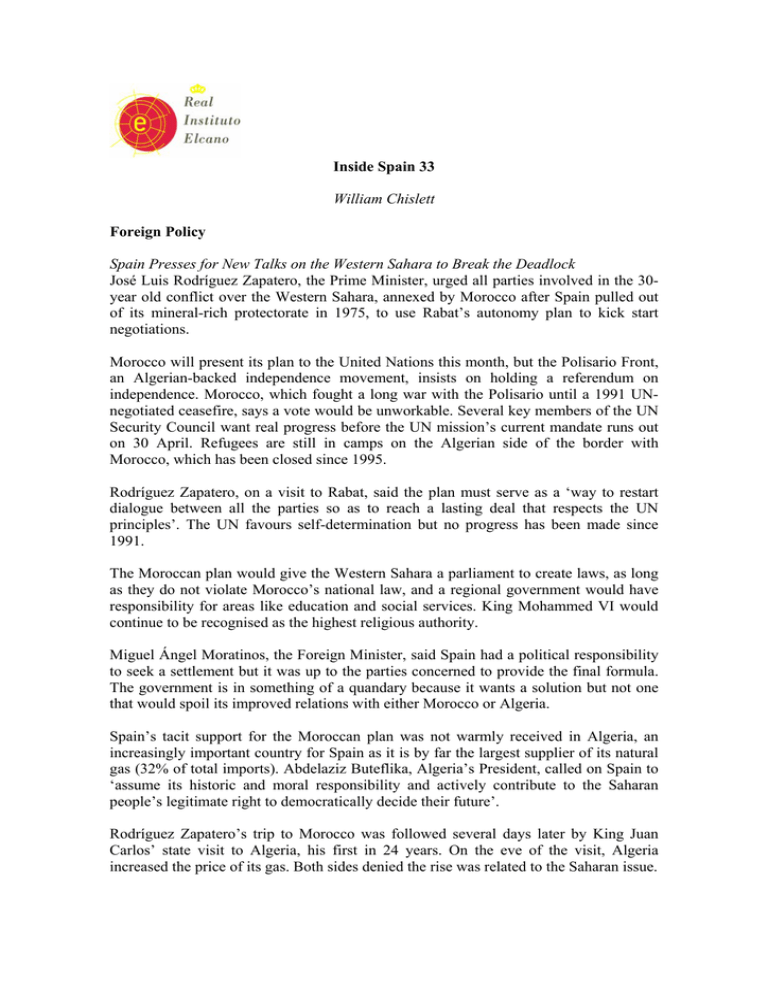
Inside Spain 33 William Chislett Foreign Policy Spain Presses for New Talks on the Western Sahara to Break the Deadlock José Luis Rodríguez Zapatero, the Prime Minister, urged all parties involved in the 30year old conflict over the Western Sahara, annexed by Morocco after Spain pulled out of its mineral-rich protectorate in 1975, to use Rabat’s autonomy plan to kick start negotiations. Morocco will present its plan to the United Nations this month, but the Polisario Front, an Algerian-backed independence movement, insists on holding a referendum on independence. Morocco, which fought a long war with the Polisario until a 1991 UNnegotiated ceasefire, says a vote would be unworkable. Several key members of the UN Security Council want real progress before the UN mission’s current mandate runs out on 30 April. Refugees are still in camps on the Algerian side of the border with Morocco, which has been closed since 1995. Rodríguez Zapatero, on a visit to Rabat, said the plan must serve as a ‘way to restart dialogue between all the parties so as to reach a lasting deal that respects the UN principles’. The UN favours self-determination but no progress has been made since 1991. The Moroccan plan would give the Western Sahara a parliament to create laws, as long as they do not violate Morocco’s national law, and a regional government would have responsibility for areas like education and social services. King Mohammed VI would continue to be recognised as the highest religious authority. Miguel Ángel Moratinos, the Foreign Minister, said Spain had a political responsibility to seek a settlement but it was up to the parties concerned to provide the final formula. The government is in something of a quandary because it wants a solution but not one that would spoil its improved relations with either Morocco or Algeria. Spain’s tacit support for the Moroccan plan was not warmly received in Algeria, an increasingly important country for Spain as it is by far the largest supplier of its natural gas (32% of total imports). Abdelaziz Buteflika, Algeria’s President, called on Spain to ‘assume its historic and moral responsibility and actively contribute to the Saharan people’s legitimate right to democratically decide their future’. Rodríguez Zapatero’s trip to Morocco was followed several days later by King Juan Carlos’ state visit to Algeria, his first in 24 years. On the eve of the visit, Algeria increased the price of its gas. Both sides denied the rise was related to the Saharan issue. Morocco’s move comes at a time of increasing concern about terrorist infiltration into Europe from the Maghreb. There are said to be terrorist camps in the sparsely populated Sahel region. A resolution of the Saharan issue would encourage greater cooperation between Morocco, Algeria and Spain over terrorism. Moroccans and Algerians were allegedly involved in the March 2004 bombing of trains in Madrid by Islamist radicals that killed almost 200 people. Parliament Rejects Sending More Troops to Afghanistan A motion put forward by the conservative Popular Party (PP) to send more troops to Afghanistan was defeated by 159 votes to 148. The motion reproduced the public commitment by José Luis Rodríguez Zapatero, the Socialist Prime Minister, to ‘provide all the necessary human and material resources to guarantee the security of our troops in Afghanistan’. The defeat of the motion was interpreted as a rejection of the request by Spain’s military chiefs for more troops, although the government says it never received such a request made, according to the PP’s leader Mariano Rajoy, at a closed door conference at the Higher Centre of National Defence Studies (Ceseden). A senior Spanish officer in Afghanistan requested more troops at the end of January when José Antonio Alonso, the Defence Minister, visited Afghanistan, something publicly recorded. Spain has close to 700 peace-keeping troops in Afghanistan out of the total of more than 35,000 in the International Security Assistance Force (ISAF). As a result of an offensive by the Taliban, the security situation has deteriorated. Should it reach the stage where more troops are needed, in order to increase the security of those already there, the government would be in an awkward position as those parties that support it, including its own, are the ones against sending reinforcements. Public opinion is turning against keeping troops in Afghanistan. In a poll for El País, the main daily, 51.4% of respondents wanted the troops home and 39% were in favour of keeping them there. Spain Presents UN Telecoms Centre Plan Spain will house the new UN communications and data centre for all peace missions in Europe. Located at Quart de Poblet, Valencia, the centre will provide logistical support to peace missions on the ground and will mean the establishment of a major sector of the UN’s activity in the field of information technology and communications. José Luis Rodríguez Zapatero, the Prime Minister, won a commitment from Kofi Annan, the former UN Secretary General, last year that the centre would be created in Spain, which has played a significant role over the past 25 years in peace-keeping missions and, according to surveys, is among the most pacifist societies in Europe. Last year parliament agreed a ceiling of 3,000 peace-keeping troops. The country currently has troops in several countries including Afghanistan and the Lebanon. Domestic Scene Opposition Popular Party Intensifies Campaign against the Government The release from prison of a convicted Basque terrorist after a 115-day hunger strike unleashed the biggest ever demonstration by the conservative Popular Party (PP) against the Socialist government and brought the brittle relations between the two main parties to an all-time low. This was the first time in Spain’s post-Franco democracy that the head of the main opposition party led a massive demonstration against the government. ‘Zapatero is no longer of any use’, said Mariano Rajoy, the PP leader, at a demonstration that drew several hundred thousand people in Madrid to protest at the release from prison but not from detention of Iñaki De Juana Chaos. He had already served an 18-year term for 25 assassinations and remained in prison for making ‘terrorist threats’ in newspaper articles. Determined not to create a martyr for Eta with his death, the government commuted the rest of the three-year sentence of the unrepentant De Juana to house arrest. Rajoy said the government had ‘capitulated to an act of terrorist blackmail, and this has weakened the state’. Zapatero said he ‘wanted to avoid the death of someone who does not know pity’. The decision, publicly supported by Felipe González, the former Socialist Prime Minister (1983-96), not to let De Juana die was the most divisive and controversial one of Zapatero’s three years in office. The government felt it was stuck between a rock and a hard place. In a survey conducted for the centre-left El País, the main daily which broadly but not uncritically supports the Socialists, 58% of respondents were against the decision (33% in favour), but 48% wanted the government to restart peace negotiations with Eta (39% against), called off last December by Zapatero after the group placed a bomb in a car park at Madrid’s airport and killed two people. Eta has killed four people in the past four years (compared with 800 in the previous 36). The PP has made demonstrations against the government’s anti-terrorism policy the axis of its strategy to win the next election and put it at the centre of Spanish politics. Its latest protest, in a highly charged atmosphere on the eve of the third anniversary of the Madrid bombings by Islamist radicals, ‘crossed a red line of democracy’ in the government’s view. Almost 67% of respondents in the El País poll disapproved of the PP attacking the government’s anti-terrorism policy, and 65% were against the PP’s constant calling of demonstrations. More than half of respondents (54%) blamed the PP for the deterioration of the political climate and 20% the government. The Socialists accuse the PP of hypocrisy. During its eight years in office (1996-2004), various steps benefited Eta prisoners, including De Juana whose sentence was reduced by 350 days for ‘intellectual achievement’ after he wrote a book defending Eta. The PP said it would raise the issue of the former Socialist government’s involvement in the GAL death squads that killed Eta members (during the 1980s) if the current government raised in parliament the PP’s measures that benefited Eta. The PP has stopped short of calling for early elections, which are due by next March. The El País poll showed that the Socialists’ share of the vote had remained virtually unchanged since the election in 2004 at 42%, while the PP’s share had inched up from 37.6% to 38.5%. On a scale of 1 to 10 evaluating the main political leaders, Zapatero was accorded 4.8 and Rajoy 3.5. The war between the two main parties carried over into the increasingly partisan press. Remarks about the PP made by Jesús de Polanco, chairman of PRISA, the owner of El País, at the Annual General Meeting of Shareholders, led Rajoy to call for a boycott of PRISA’s many media outlets. Polanco said it was ‘very difficult to be neutral when one of the parties believes that anything goes in order to recover power’ and that the PP was far from being the moderate conservative party that Spain needed. He called the PP’s demonstration ‘pure Francoism’, in allusion to the dictator who ruled Spain between 1939 and 1975. Rajoy demanded an apology and instructed the PP not to cooperate in any way with PRISA or advertise in its media until Polanco made amends. Gender Equality Law Approved, Sex Discrimination at Work Banned The parliament approved an equality law which, among other things, bans sex discrimination at work and gives 15 days of paternity leave for men. The law, backed by all parties except the conservative Popular Party (PP), was the most important step to achieve equality between men and women since the 1978 constitution. Women have advanced considerably since the end of the 1939-75 dictatorship of General Franco –when, for example, divorce and contraception were forbidden and women needed the permission of their father or husband to open a bank account–. Today, more women graduate from university than men. But society is still very maledominated. For example, according to the stock market regulator, more than two-thirds of Spain's top 35 listed companies have no female board directors, and only 6% of directorships in listed companies are held by women, most of whom represent family shareholdings. The law makes it obligatory for women to represent at least 40% of the electoral lists of political parties. This was one reason why the PP voted against the law as it believes this move was unnecessary. José Luis Rodríguez Zapatero, the Prime Minister, led the way on the issue of women in politics by evenly splitting the members of his cabinet between men and women when he took office in 2004. Feminists and the main business confederation, however, were dissatisfied with the new law for very different reasons. While feminists groups said it did not go far enough, the confederation was particularly angry with the stipulation that companies with more than 250 workers have to introduce ‘equality plans’ aimed at eliminating discrimination against women in pay, promotion and benefits. Registered Foreigners Surpass 4 Million The number of foreigners resident in Spain who have registered with their local town hall was 4.1 million at the beginning of 2006, 413,556 more than in 2005, according to the latest figures from the National Statistics Institute (see Figure 1). Roughly one in every seven is Moroccan (see Figure 2). Figure 1. Number of registered foreigners, 1999-2006 (millions) 1999 2000 2001 2002 2003 Number 0.74 0.92 1.37 1.97 2.66 2004 3.03 2005 3.73 2006 4.14 Source: INE. Figure 2. Foreigners by main nationalities Country Morocco Ecuador Rumania United Kingdom Colombia Germany Argentina Bolivia Italy China Number 563,012 461,310 407,159 274,722 265,141 150,490 150,252 139,802 115,791 104,681 % of Total Foreigners* 13.5 11.3 9.8 6.6 6.4 3.6 3.6 2.7 2.7 2.5 (*) The total used is 4.1 million. Source: INE. The great majority of immigrants register because it entitles them to public health and education facilities. The total number of foreigners is higher because not everyone registers (for example, only 274,722 of the more than 760,000 Brits estimated by the Institute for Public Policy Research to be living permanently in Spain). Separately, the government announced that almost 250,000 direct relatives of immigrants were authorised to settle in Spain between 2004 and 2006 (30% of the 803,370 non-EU foreigners who obtained a residency permit in this period). Spanish law allows the relatives of immigrants who have been in the country for a year and have permission to stay for at least another year to bring over direct relatives (spouses and children under the age of 18). Spain the Only Big EU Country that Believes Life has got Better since Joining the EU Fifty years after the Treaty of Rome, which ushered in the European Union, Spain is only country of the five largest European nations that believes life has not become worse since becoming part of the EU. According to a Financial Times/Harris Poll, Spanish adults are the most positive about the effect that joining the EU (in 1986) has had on their country, with more than half (53%) stating that life has got better (see Figure 3). In the other countries substantial proportions feel that life in their country has become worse. Figure 3. Quality of life since becoming part of the EU (%) UK France Better 13 19 Worse 52 50 Stayed the same 21 25 Not sure 14 7 Note: Percentages may not add up exactly to 100% due to rounding. Source: Financial Times/Harris Poll. Italy 24 47 25 4 Spain 53 24 18 5 Germany 22 44 24 9 Other highlights of the poll, also carried out in the US, are: • • • • • Majorities or pluralities in all five EU countries think Turkey will eventually form part of the EU. There is a division between the majority of adults in Great Britain and the plurality in Germany who are opposed to an EU army, and the majority in France and Italy, and a plurality in Spain who would support this. Few people, except perhaps the 31% in Italy, think that EU regulations have had a positive impact on business in their countries. In all five EU countries except for France, pluralities believe they have had a negative impact. There is no consensus on the likely impact of a new EU constitution. A majority in Italy and a substantial plurality in Spain think it would have a positive impact. A large plurality in Great Britain think it would have a negative impact. Only in Italy does a plurality not think that the US is the greatest threat to global stability. The Economy Protracted Bid Battle for Endesa Hots Up and Turns Acrimonious Caja Madrid, the third-largest shareholder in Endesa, aligned itself with Germany’s E.on which increased its offer for Spain’s largest electricity company. Meanwhile, Spain’s Acciona and Italy’s Enel increased their rival bid which was denounced by E.on as a deliberate attempt to interfere with Endesa shareholders’ proper consideration of its offer. E.on urged Spanish regulators to open infringement proceedings against the two companies and is suing them in the US. The big savings bank agreed to cede its 10% stake in Endesa to E.on through an equity swap under which it would retain its voting rights for two years. Endesa’s shareholders must decide by 3 April –and 6 April in the US– whether to tender their shares to E.on or wait until October, as required by the Spanish regulator, for a formal bid by Enel and Acciona, which between them currently own 46% of Endesa. Enel and Acciona said they would appeal against this moratorium. E.on raised its offer for Endesa to €42.4 billion (€40 a share) and hard on its heels came a new offer from Acciona and Enel of €43.4 billion (€41 a share). These prices are almost double that of Gas Natural, the government’s preferred choice as it would have created a national champion, made more than 18 months ago. Gas Natural dropped out of the race earlier this year. E.on said the increased rival bid was ‘an attempt to deceive Endesa’s shareholders and to manipulate the market price of Endesa’s stock’. With Endesa’s share price trading on the market at higher than the €40 offered by E.on, its bid was unlikely to prosper. Sepi, the state holding, which holds 2.9% of Endesa, said it would reject the offer. Meanwhile, the European Commission announced it was taking the government to the EU's highest court, the European Court of Justice, for not lifting certain conditions it imposed last year on E.on’s bid for Endesa (see Inside Spain, Newsletter 31, 1 February 2007). ACS Acquires 25% Stake in Germany’s Hochtief Actividades de Construccion y Servicios (ACS), Spain’s largest construction company by sales, is to pay €1.26 billion for 25% of Hochtief, making it the German company’s largest shareholder. ACS and Hochtief were, respectively, the world’s third and fourth largest construction companies in 2006 (see Figure 4). Figure 4. World’s largest construction companies, 2006 Company 1. Bouygues (France) 2. Vinci (France) 3. Hochtief (Germany) 4. ACS (Spain) 5. Skanska (Sweden) 6. Ferrovial (Spain) 7. Eiffage (France) 8. Colas (France) 9. Taisei (Japan) 10. FCC (Spain) Sales (€ million) 26,408 25,634 15,000 14,067 13,502 12,355 10,745 10,717 10,174 9,481 Source: Bloomberg, ACS. Hochtief’s strong business in the US and Asia is particularly attractive for ACS which is seeking international expansion. In a separate development in Spain’s booming construction sector, the consortium of Sacyr Vallehermoso and Fomento de Construcciones y Contratas (FCC) was awarded a 35-year concession for the M50 motorway in Dublin. This is the second concession in Ireland won by the consortium made up of Sacyr’s Itinere unit with 45%, FCC with 45% and PJ Hegarty with 10%. The construction boom doubled the number of Spaniards who made it into the latest Forbes list of the world’s richest individuals. The list of billionaires includes 20 Spaniards, 10 more than last year and eight of whose fortunes are related to construction or real estate activities. The richest Spaniard is Amancio Ortrega, the chairman of the Inditex Group with US$24 billion who jumped from 23rd to 8th place in the ranking (see Figure 5). Figure 5. The 10 richest Spaniards (US$ billion) Name Amancio Ortega (8) Rafael del Pino (79) Enrique Bañuelos (95) Esther Koplowitz (137) Alicia Koplowitz (158) Luis Portillo (237) Manuel Jove (249) Isak Andic (264) Rosalía Mora (264) Jesús de Polanco (287) Fortune 24.0 8.6 7.7 5.6 5.0 3.7 3.5 3.4 3.4 3.0 Company Inditex Ferrovial Astroc FCC Inversiones Inmocaral Fadesa Mango Inditex Prisa Note: ranking in brackets. Source: Forbes. Mapfre Acquires Turkish Insurer for €285 million Mapfre, the big insurer, is to buy 80% of Turkey’s Genel Sigorta for €285 million. The investment is believed to be the largest by a Spanish company in the country of 71 million people which is struggling to join the EU. Genel is Turkey’s 6th largest company for car insurance and 10th largest for non-life, with an overall market share of 3.2%. Inditex Overtakes Gap to Become World’s Second-Largest Clothing Retailer Inditex, the owner of Zara and Bershka stores among others, overtook the US Gap to become the world’s second-largest clothing retailer. Inditex had 3,135 stores in 64 countries at the end of March. Inditex plans to open as many as 490 stores in the year through January 2007, more than the 448 opened last year everywhere from Shanghai to Serbia. The leader is Benetton with more than 5,000. Spain Creates Four out of every 10 Jobs in the EU Spain created 774,000 jobs in 2006, 40% of the total created in the 12 countries of the Euro zone. The proportion of temporary jobs in total employment, however, remained by far the highest at close to one-third. And it recorded a public sector budget surplus of 1.8% of GDP, its highest for 30 years. Spain is one of only four Euro zone countries, including Finland, Ireland and the Netherlands, with a public sector surplus. But the current account deficit reached €86,026 million, the second-largest in the world after the US and 29% more than in 2005. At 8.8% of GDP, it was also the secondlargest in the Euro zone on this basis (see Figure 6). The big trade deficit, reflecting the heavy oil bill and the general surge in imports, and stagnant tourism receipts were the main factors behind the current account deficit. Figure 6 Thanks to Spain being a member of the monetary union, the current account deficit will not lead to a devaluation as it did several times before the country joined the euro (the last devaluation of the peseta was in 1995). But precisely because there will not be a currency crisis, the necessary adjustment will eventually have to come through other changes, notably in wages and prices. The deficit underscores Spain’s ailing external competitiveness (see Figure 7). The IMF, in its latest assessment of the Spanish economy, said the deficit and the high levels of household and corporate indebtedness were the ‘greatest risk for the projected soft landing’. Figure 7 Meanwhile, Spain’s total taxes in GDP terms moved closer to the EU average in 2005 (latest year available). The tax burden rose a full percentage point between 2004 and 2005 to 36.4% of GDP, compared with an EU-27 average of 40.8% and a Euro zone average of 41.2% (see Figure 8). The rise was the largest one in a single year since 1995 and was due to the buoyancy of the economy, greater success in combating tax fraud and corporate and income tax rates higher than many EU countries (the rates have since been reduced under a tax reform effective as of 2007). Figure 8. Total taxes (% of GDP), selected EU countries Country France Germany Italy Poland Spain United Kingdom EU-27 Euro zone % of GDP 45.8 40.2 40.8 34.2 36.4 38.6 40.8 41.2 Source: Eurostat. Tourism Industry Ranked Low in WEF League Spain’s tourism industry, one of the lynchpins of the economy and the second largest in the world in the number of visitors, was ranked 15th out of 20 countries (see Figure 9) in the first ranking of its kind by the World Economic Forum (WEF). Figure 9. Travel and Tourism Competitiveness Index, Top 20 Countries Country Country 1. Switzerland 11. Denmark 2. Austria 12. France 3. Germany 13. Australia 4. Iceland 14. New Zealand 15. Spain 5. United States 6. Hong Kong 16. Finland 7. Canada 17. Sweden 8. Singapore 18. United Arab Emirates 9. Luxembourg 19. Netherlands 10. United Kingdom 20. Cyprus Source: European Commission. Spain’s travel and tourism economy, as defined by the World Travel & Tourism Council, generates close to 18% of GDP and contributes 19% of employment. The Travel and Tourism (T&T) Competitiveness Index covers 124 countries and measures the factors and policies that make it attractive to develop the T&T sector. Among Spain’s competitive disadvantages are the rules governing foreign direct investment, business costs of tourism, airport density, fuel price level and hiring and firing practices. The competitive advantages include the presence of major car rental companies, hotel rooms and ATMs accepting Visa cards. Spain Relatively Well Placed to Meet EU Renewable Energy Targets Spain’s increasing use of wind energy puts it in a good position to make a positive contribution to the EU’s recent commitment to combat climate change by boosting the generation of renewable energy. Spain is heavily dependent on imports of oil and natural gas and while many EU economies are becoming more energy efficient (measured by the units of energy per unit of GDP) Spain’s energy intensity is rising. Last year wind power accounted for 9% of Spain’s power consumption, coal-fired power stations put in 24%, nuclear power 22% and the rest came from other sources. On a particularly gusty day last month, Spain’s wind energy generators reached an all-time high in electricity production, exceeding power generated by all other means, according to Red Electrica, the nation’s electricity network authority. Wind power generation reached 27% of the country’s total power requirement, outstripping for the first time nuclear power’s contribution to the power grid. Iberdrola is the world’s largest owner and operator of renewable energy facilities. The 27 EU states will each decide now to meet the target of a 20% overall increase in renewable energy by 2020. Spain wants wind power to replace nuclear power: tall, slender electricity generating turbines are increasingly appearing on remote hillsides. Solar energy is also on the rise: the world’s largest ‘solar orchard’ was inaugurated last month in Milagro, Navarra, where 889 panels generate 14 million Kw an hour (the equivalent to that consumed by 5,000 homes).

